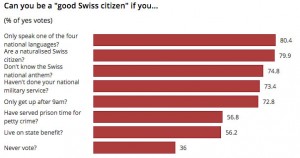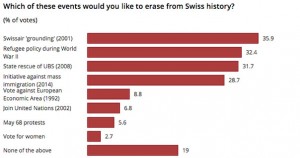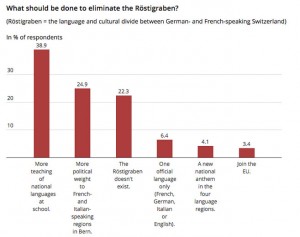Can you be a good Swiss citizen if you don’t know the national anthem or haven’t done military service? Two sociologists decipher a landmark poll that holds a mirror up to the Swiss population.
Fifty years after the controversially censored ‘Gulliver’ survey of the Swiss people (see infobox) carried out during the Swiss National Exhibition in Lausanne in 1964, a group of artists, historians and sociologists have marked the anniversary with a similar act of self-reflection.
Their new survey containing 25 questions covers a range of issues but the basic goal is the same: to examine Swiss attitudes and sensibilities and see whether a ‘Swiss’ opinion or shared common values exist.
So what constitutes a ‘good Swiss citizen’? According to the results of the poll, this notion certainly seems to have been relaxed over the past 50 years.
As the table shows, you are still considered a good Swiss citizen even if you only speak one language, have been naturalised, do not know the national anthem, haven’t done your military service or only get up after 9 o’clock (the famous question from 1964). But most people draw the line if you never vote (only 36% say you are a ‘good Swiss citizen) or if you live on state benefits (56.2%).
 “We see a definite increasing rejection of “bourgeois conformism”, which has been sort of picked apart,” said René Levy, honorary professor of sociology at Lausanne University.
“We see a definite increasing rejection of “bourgeois conformism”, which has been sort of picked apart,” said René Levy, honorary professor of sociology at Lausanne University.
Olivier Moeschler, also a sociology professor at Lausanne University, concurred.
“We see contrasts between a more relaxed attitude towards old traditional Swiss values, but at the same time a kind of addiction to the value of work, while a distancing and great distrust of international finance and institutions like the World Economic Forum (WEF) and UBS but faith in the Swiss franc,” he added.
“Should a working day be less than eight hours? The majority of people say no. So you can get up after 9 o’clock and be a good Swiss citizen, but you have to work at least eight hours.”
The dream job of those polled was teacher, followed by artist. As another rejection of global finance, more refused the idea of working on the stock exchange (56%) than of emptying dustbins (45%).
Around 64% agreed to pay more taxes if the money went towards looking after elderly or disabled people. But most rejected the idea of giving more tax money to development aid, culture or the integration of foreigners (81%).
“We accept support measures for elderly and disabled people but not for modern families, hence the notion of ‘socially conscious conservatism’,” said Levy.
 Attitudes towards foreigners remain complex and ambiguous. Around half of those polled said they had one grandparent of foreign origin, while 23% had four grandparents who were immigrants. Those polled generally agreed that foreigners contribute towards the country’s success, but 75% refused the idea of their commune opening a centre for asylum-seekers.
Attitudes towards foreigners remain complex and ambiguous. Around half of those polled said they had one grandparent of foreign origin, while 23% had four grandparents who were immigrants. Those polled generally agreed that foreigners contribute towards the country’s success, but 75% refused the idea of their commune opening a centre for asylum-seekers.
Islam suffers from a negative image. Around 85% of people said it was a religion that oppressed women and 64% said the Quran was less tolerant than the Bible. Only 21% felt Islam was compatible with democracy.
“This is not new but there is a kind of instinctive rejection of immigrants and a withdrawal into ourselves. It’s an old phenomenon. The idea of “overpopulation caused by foreigners” dates back to the beginning of the 20th century and has re-appeared a few times. We haven’t managed to instil in the majority of the population a positive interpretation of immigration. It’s regularly seen as a threat,” said Levy. “If you compare with 1964, Islam seems to have replaced Communism.”
A huge majority (85%) also rejected the idea of joining the European Union in the next ten years.
Meanwhile, a minority (22%) say there is no such thing as a Röstigraben – the imaginary cultural and social divide between German and French-speaking parts of the country. Those who said it does exist believe it can be eliminated by teaching more national languages at school (38.9%), and giving more political weight to Italian- and French-speaking Switzerland (24.9%).
 But the sociologists said rather than focusing on a Röstigraben, a more striking finding was the large ‘Polenta-graben’ between Italian-speaking Switzerland and the rest of the country.
But the sociologists said rather than focusing on a Röstigraben, a more striking finding was the large ‘Polenta-graben’ between Italian-speaking Switzerland and the rest of the country.
“Canton Ticino stands out on a whole range of issues such as a tougher stance towards foreigners and a greater attachment to the notion of Swissness, or classic traditional Swiss values. It’s a problem that isn’t really talked about in the media. But it’s something discussed in Ticino, as they feel threatened from exterior and abandoned by the other Swiss,” said Levy.
So what other conclusions and comparisons can be made between the two polls carried out 50 years apart?
“We’re definitely an ambivalent population, but tolerant and happy with modern concerns and dreams and extremist fringes,” wrote Michael Kinzer, director of Lausanne’s Festival de la Cité, in the introduction to the report on the Point de Suisse survey he co-initiated.
Levy was more downbeat: “The euphoria and optimism of the past has been replaced by a post-modern pessimism. The growth and overheating of the 1945-1975 period [known as the 30 Glorious Years] has turned into crisis, zero growth or decline. The birth of the young generation has turned into an ageing society. The impression that everything is still to be achieved – Expo 64’s slogan was ‘Believe and Create’ – has turned into the idea that everything has already been said and done. And the idea that ‘It’ll be better in the future’ has become a feeling of, ‘It was better before’.
Moeschler was more circumspect: “Basically the country is doing really well. But it seems that the more it goes on like this, the less people seem to want to share with others.”
The two periods and respective zeitgeists also reveal very different attitudes towards the questionnaires. In 1964 the Swiss cabinet censored the Gulliver survey and banned the publication of its results. But today it’s the opposite with vast amounts of information freely available and no censorship.
Should today’s government be worried by the results of the 2014 Point de Suisse poll?
“I think there is sufficient material there,” said Levy. “We see large consensus on certain points like a flexible retirement age or assisted suicide, and heavy scepticism about social inequalities, especially tax gifts for the rich. But politicians don’t seem in a hurry to do anything.”
Despite the gloomy conclusions one important statistic stands out: 76% of Swiss declare themselves to be happy nowadays.
By Simon Bradley
Source: swissinfo.ch







